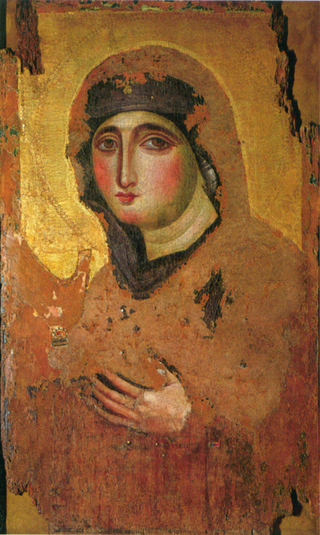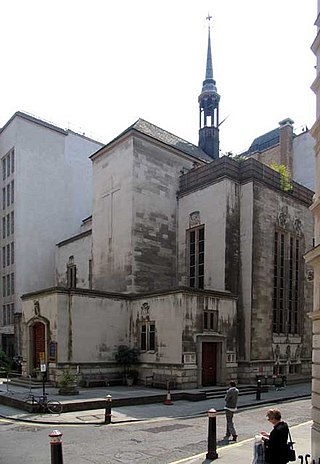Related Research Articles

Mary was a first-century Judean woman of Nazareth, the wife of Joseph and the mother of Jesus. She is a central figure of Christianity, venerated under various titles such as virgin or queen, many of them mentioned in the Litany of Loreto. The Eastern and Oriental Orthodox, Church of the East, Catholic, Anglican, and Lutheran churches believe that Mary, as mother of Jesus, is the Mother of God. Other Protestant views on Mary vary, with some holding her to have considerably lesser status.
William Whittingham was an English Puritan, a Marian exile, and a translator of the Geneva Bible. He was well connected to the circles around John Knox, Bullinger, and Calvin, and firmly resisted the continuance of the English liturgy during the Marian exile. At last, he was ordained by the Presbyterians in Geneva. Upon his return to England, he became a well-known opponent to the rites of the Church of England. Through the patronage of the Earl of Leicester, he was collated to the Deanery of Durham, but in 1579 action was started to deprive him of all holy orders on account of his Presbyterian ordination. The process of deprivation was in process, when Whittingham died in 1579. The full record of Whittingham's appointment and trial may be found in Strype's Annals, II.ii., pp. 167, 168, 620.

The Assumption of Mary is one of the four Marian dogmas of the Catholic Church. Pope Pius XII defined it on 1 November 1950 in his apostolic constitution Munificentissimus Deus as follows:
We pronounce, declare, and define it to be a divinely revealed dogma: that the Immaculate Mother of God, the ever Virgin Mary, having completed the course of her earthly life, was assumed body and soul into heavenly glory.

The Annunciation, also referred to as the Annunciation to the Blessed Virgin Mary, the Annunciation of Our Lady, or the Annunciation of the Lord, is, according to the Gospel of Luke, the announcement by the archangel Gabriel to Mary that she would conceive and bear a son through a virgin birth and become the mother of Jesus Christ, the Christian Messiah and Son of God, marking the Incarnation. Gabriel told Mary to name her son Immanuel, meaning "God is with us".

The vestments controversy or vestarian controversy arose in the English Reformation, ostensibly concerning vestments or clerical dress. Initiated by John Hooper's rejection of clerical vestments in the Church of England under Edward VI as described by the 1549 Book of Common Prayer and 1550 ordinal, it was later revived under Elizabeth I. It revealed concerns within the Church of England over ecclesiastical identity, doctrine and church practices.

Strangers' church was a term used by English-speaking people for independent Protestant churches established in foreign lands or by foreigners in England during the Reformation.

The Marian exiles were English Protestants who fled to Continental Europe during the 1553–1558 reign of the Catholic monarchs Queen Mary I and King Philip. They settled chiefly in Protestant countries such as the Netherlands, Switzerland and Germany, and also in France, Italy and Poland.

The Congregation of Marian Fathers of the Immaculate Conception of the Most Blessed Virgin Mary is a Catholic male clerical religious congregation founded, 1670, in Poland. It is also known as Marians of the Immaculate Conception. Its members add the post-nominal letters M.I.C. after their names to indicate membership in the Congregation.
Anglican Marian theology is the summation of the doctrines and beliefs of Anglicanism concerning Mary, mother of Jesus. As Anglicans believe that Jesus was both human and God the Son, the second Person of the Trinity, within the Anglican Communion and Continuing Anglican movement, Mary is accorded honour as the theotokos, a Koiné Greek term that means "God-bearer" or "one who gives birth to God".
Anthony Gilby (c.1510–1585) was an English clergyman, known as a radical Puritan and translator of the Geneva Bible, the first English Bible available to the general public. He was born in Lincolnshire, and was educated at Christ's College, Cambridge, graduating in 1535.
Leonard Pilkington (1527–1599) was an English academic and clergyman. A Marian exile, he became Regius Professor of Divinity at Cambridge and Master of St John's College, Cambridge at the start of the reign of Elizabeth I. In his subsequent church career, he followed the way opened when his brother James Pilkington became Bishop of Durham.

Thomas Bickley (1518–1596) was an English churchman, a Marian exile who became Warden of Merton College, Oxford and Bishop of Chichester
Gilbert Berkeley (1501–1581) was an English churchman, a Marian exile during the reign of Bloody Mary, and then Bishop of Bath and Wells.
John Brett may refer to:
A Narrative of the Pursuit of English Refugees in Germany Under Queen Mary was a 1550s English chronicle by John Brett.
Edward Isaac was an influential 16th-century English Protestant and Marian exile. He was a lay supporter of John Bland. He resided at Well Court in Ickham and Well, Kent.
The 2012 International Origin series was the second time the rugby league International Origin has been played. It was a two-game series between England and Exiles RL as a follow-up to the 2011 International Origin series. There was a couple of changes in personnel for the Exiles team in 2012, a key change being that former St. Helens coach Daniel Anderson was selected to be the head coach of the Exiles; also, former Exiles captain Danny Buderus went back to Australia following the 2011 season so former New South Wales fullback Brett Hodgson replaced him as captain.

The Marian civil war in Scotland (1568–1573) was a period of conflict which followed the abdication of Mary, Queen of Scots, and her escape from Lochleven Castle in May 1568. Those who ruled in the name of her infant son James VI fought against the supporters of the Queen, who was exiled in England. Edinburgh Castle, which was garrisoned in her name, became the focus of the conflict and surrendered only after an English intervention in May 1573. The conflict in 1570 was called an "intestine war in the bowels of this commonwealth", and the period was called soon after an "intestine war driven by questions against authority."
Arthur Saul was an English Puritan cleric and academic, a Marian exile and canon of Gloucester Cathedral.

The Troubles at Frankfurt was a name given retrospectively to internal quarrels of the Marian exiles in Frankfurt am Main in the mid-1550s, involving also the Scottish reformer John Knox. Politically, Frankfurt was a Free Imperial City of the Holy Roman Empire.
References
- ↑ The Marian Exiles, Christina Hallowell Garrett, p.37